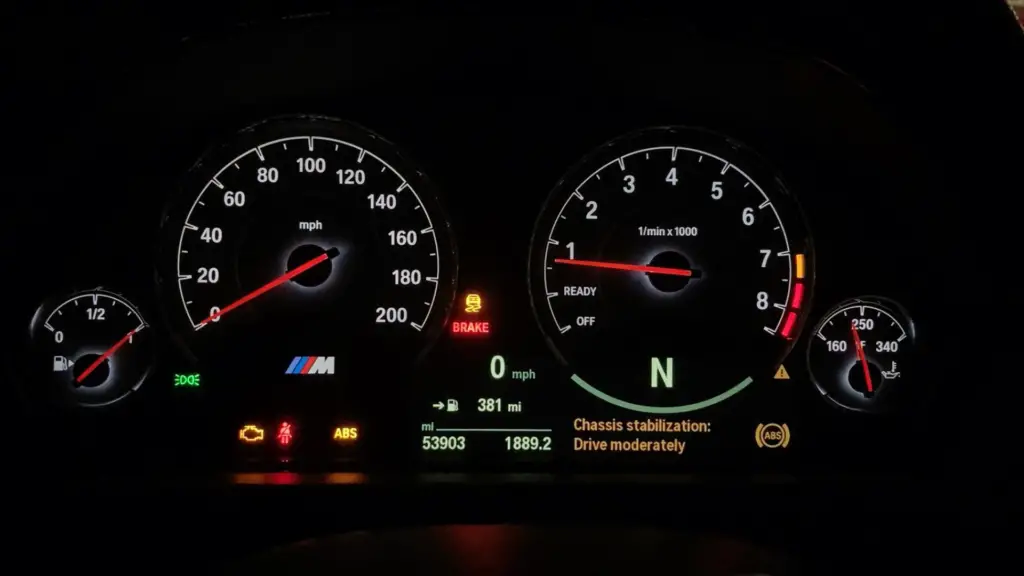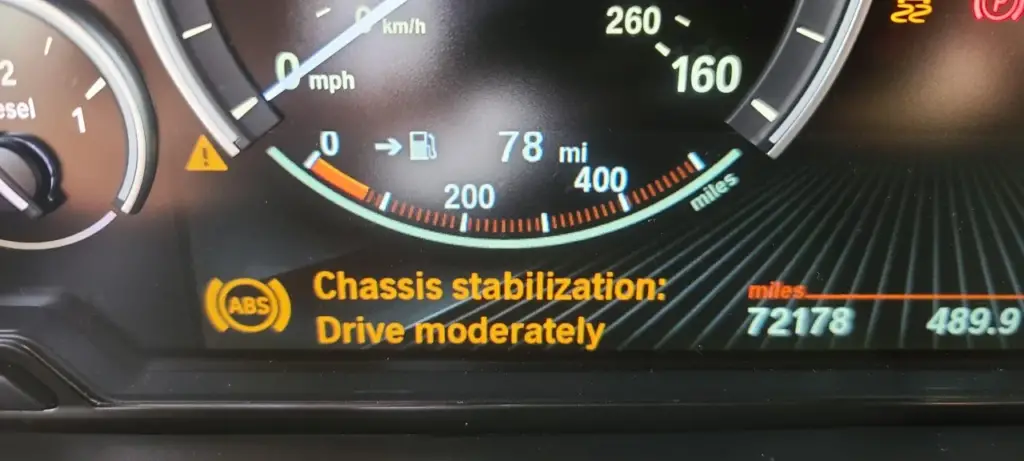Fix Chassis Stabilization Malfunction BMW in 5 Easy Steps
The Chassis Stabilization malfunction in your BMW can happen due to a faulty ABS sensor. Replacing the faulty sensor is crucial to restore proper ABS system functionality.
Also, issues with the brake system can lead to this issue. a comprehensive examination of brake components, along with timely repairs can resolve this.
In this article, I will share all the reasons and solutions for chassis stabilization malfunction BMW. At the end of this article, you’ll have proper knowledge when dealing with the issue.

Contents
- 1 5 Easy Steps to Deal with BMW Chassis Stabilization Malfunction
- 2 What Is Chassis Stabilization On BMW?
- 3 BMW Chassis Stabilization Malfunction: Detailed Overview
- 4 Cost To Repair BMW Chassis Stabilization Malfunction?
- 5 Can You Drive a BMW With The Chassis Stabilization Malfunction Code?
- 6 Frequently Asked Questions (FAQs):
- 7 Final Words
5 Easy Steps to Deal with BMW Chassis Stabilization Malfunction
The following table will provide you with a quick overview of how to deal with BMW chassis stabilization malfunction.
| Reasons | Solutions |
| ABS Sensor malfunction | Replace the faulty ABS sensor |
| Brake system issues | Inspect and repair the brake system components |
| Suspension problems | Check and address any suspension issues |
| Engine-related concerns | Examine and fix engine-related problems |
| Transmission issues | Address any transmission problems |
However, these are just the quick solutions. To deal with the issue properly, you need to learn about the issue in detail and step-by-step guidelines. Continue reading the article to learn more.
What Is Chassis Stabilization On BMW?
Chassis stabilization is a crucial feature of your BMW car, allowing you to take further measures to ensure better car control. Moreover, Dynamic Traction Control (DTC) ensures your car is not running out of control.
Therefore the chase stabilization on your BMW can also mean that the Dynamic Traction Control (DTC) is not functioning correctly. As mentioned above, the generic warning message can pop up in several forms.
Among them, the most common message can be ‘Chassis Stabilization; drive moderately, consult nearest service center.’
As the name suggests, BMW wants you to drive your car slowly and, if needed, contact the nearest repair shop if the issue gets worse due to this generic message.
Moreover, as your car’s dynamic Traction Control (DTC) Module tends to malfunction, sudden brake engagement can harm your car.
So, when you drive your car at a lower speed, you may only need to break your vehicle sometimes, as your car’s safety system needs to respond appropriately.
BMW ensures many sensors are connected to different parts and systems of their cars. At the end of the day, these sensors can hugely play their role by helping the chassis stabilization warning message to take place.
However, it can also be a moment and interaction issue in many cases if you don’t notice this warning message frequently.
Bonus: You might also want to know the fixes for BMW X3 Drivetrain Malfunction.

BMW Chassis Stabilization Malfunction: Detailed Overview
When you are driving your BMW car and suddenly witness the chassis stabilization warning, it can be really annoying. Luckily, the solutions are straightforward. In this section, we will discuss each reason and the solutions in detail.
Reason 1: ABS Sensor Malfunction
The Chassis Stabilization malfunction can happen in your BMW due to a malfunctioning ABS sensor. This sensor plays a crucial role in ensuring optimal braking performance and stability.
Symptoms:
- Multiple dashboard lights illuminated
- Unusual brake pedal behavior
- Weak acceleration response
Solution:
Replace the faulty ABS sensor. Consult a professional mechanic or use an OBD scanner to identify the specific ABS sensor causing the issue.
Once identified, the sensor can be replaced, restoring the proper functioning of the ABS system.
Reason 2: Brake System Issues
Issues within the BMW’s brake system can trigger the Chassis Stabilization warning message. A comprehensive inspection of various brake components may be necessary.
Symptoms:
- The parking brake light is illuminated
- The brake system light is activated
- Unusual behavior of the brake pedal
Solution:
Conduct a thorough examination of the brake system, including the brake pads, rotors, calipers, and fluid levels.
Address any identified issues promptly. This may involve replacing worn-out brake components, adjusting the brake system, or replenishing brake fluid levels.
Reason 3: Suspension Problems
Problems in the suspension system can contribute to the Chassis Stabilization malfunction. The suspension is crucial for maintaining stability and handling.
Symptoms:
- Unsteady suspension behavior
- Difficulty steering, especially during turns
- The steering wheel not returning to the center position
Solution:
To fix the suspension issues with your BMW:
- Inspect the suspension components, such as shocks, struts, and control arms.
- Replace any damaged or worn-out parts.
- Properly align the wheels and ensure the suspension system is in good condition to restore stability.
Reason 4: Engine-Related Concerns
Issues in the engine can also trigger the Chassis Stabilization Warning, affecting overall vehicle performance.
Symptoms:
- Limp mode activation
- Weak acceleration
- Unusual engine behavior
Solution:
Perform a comprehensive diagnostic check on the engine. Address any identified issues, such as faulty sensors, misfires, or other engine-related problems.
Regular maintenance and timely repairs can prevent engine-related malfunctions.
Reason 5: Transmission Issues
Problems in the transmission can lead to instability and trigger the Chassis Stabilization Warning Light.
Symptoms:
- Unusual behavior during gear shifts
- Difficulty accelerating smoothly
- Transmission-related warning lights
Solution:
Investigate transmission-related issues using an OBD scanner. Fix any identified problems, which may include repairing or replacing malfunctioning transmission components. Regular transmission maintenance can prevent such issues.
Cost To Repair BMW Chassis Stabilization Malfunction?
The cost may vary as many tasks are involved in fixing BMW chassis stabilization. Beyond that, if components need to be replaced rather than repaired, it tends to cost more money.
In addition, the repair cost of fixing the malfunction is also something you should consider.
However, considering all the factors mentioned above, fixing the BMW chassis stabilization will cost you approximately $1000-$8000.
The more serious the issue is, the more money you need to spend to solve it. Thus, the cost range might go beyond $8000 as well.
Make sure you have a decent conversation with the mechanic or repair shop about how they can reduce the cost.
Can You Drive a BMW With The Chassis Stabilization Malfunction Code?
Yes, you can drive your car with the chassis stabilization code but it is not recommended. Sometimes you can only think of driving your car once you fix the code related to your car’s safety system.
Moreover, as the code suggests ‘Drive Moderately’, you should realize its meaning.
But ask me what other things can happen if you drive your car with the chassis stabilization warning message. Well, as you are not encouraged to use brakes frequently, and your vehicle is out of control, there is a chance of an accident.
But then again, if you have to drive your car, make sure you drive it at a lower speed.
In addition, as Dynamic Traction Control (DTC) is not supposed to work, you should avoid driving your car on wet roads.
Long story short, once you notice the warning message, you shouldn’t ignore it, and a check of the parts related to the issue is the best thing you can do.
Bonus: You may also want to learn how to fix a BMW Emergency Call Malfunction.
Frequently Asked Questions (FAQs):
What Is Chassis Control On a BMW?
Chassis control in a BMW refers to a feature designed to uphold the car’s stability, handling, and overall control. This is achieved through the coordination of sensors and actuators strategically positioned throughout the vehicle.
Does Chassis Impact the Performance of Your BMW?
The performance of a vehicle is notably influenced by the choice of chassis. It shapes how the car handles, its on-road feel, and overall capabilities across various driving conditions.
How Do You Know If The Chassis Is Damaged?
To determine if your chassis is damaged, inspect the undercarriage of your vehicle for visible signs of distortion. Examine the frame structure for dents, creases, or bends, as some damage may be more apparent than others.
Final Words
The warning message of chassis stabilization BMW can occur anytime and remind you to be conscious about the safety system and other related components.
While checking the parts, check through an expert mechanic because you might want to avoid driving your car with an anti-brake system or faulty suspension.
This feature of BMW helps run your BMW smoothly. So, make sure you take full advantage of it. If you have proper knowledge about automation, try to fix the issue yourself. Otherwise, taking the car to a mechanic will be the better choice.